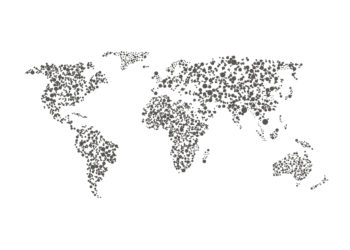The world’s problems need all the world’s people. As discussed in a recent guest post from Andy Nobes, “New Platform Facilitates International Research Collaboration to Help Solve our Biggest Global Challenges,” it is particularly important to find ways to encourage and sustain researchers from the Global South. AuthorAID, a project of INSAP, through its platform services and community, is offering researchers a means of making global connections. These opportunities to identify and support collaborations, potential funding sources, and grant writing and publishing, can bolster the production and circulation of research findings from low and middle income regions.

While AuthorAID has an ambitious global to address the needs of researchers across disciplines and fields, a project at the University of Michigan focuses closely on “building scientific writing capacity,” for grants and for research publication, within the field of Public Health. Ella August, a faculty member in Epidemiology at Michigan’s School of Public Health, has launched with a group of colleagues the Pre-Publication Support Service (PREPSS). By developing and harnessing a community of expertise, PREPSS is designed to follow up writing intensive workshops with mentoring Health researchers from low resource regions through the publication process.
For now, the process is by invitation to authors who have participated in those workshops, held in Ecuador, China, Kenya, Ethiopia and Rawanda thus far, and is developing collaborations with government organizations in these countries, as well as with journals that do not have the staff to provide intensive mentoring to see what could be very high quality research into the format necessary for competitive publication. The writing workshops have sometimes been stand-alone, sometimes piggybacked on other initiatives underway to train researchers, for example, on data analysis. The goal, though, is for PREPSS to follow up these intensive workshops, which focus on first order research questions, and provide mentoring all the way through the publication process.
The real key is the focus on coaching writing. August, an experienced public health researcher, took an MA in writing just last year, and described the experience as transformative. Committed to writing as foundational for science, she teaches a course at Michigan in Scientific Communication for Epidemiologists. Enrolled students learn and then practice the standard academic scientific formats such as abstracts, posters, and journal articles. They workshop drafts, learning to be writers as well as productive critics of one another’s work.
Earlier this year August and James Trostle of Trinity College and the University of Chile co-authored an article in the Journal of Public Health on writing pedagogy and resources. Analytical and communications skills, they argue, have been at the foundation of liberal arts educations but may be “lacking in many STEM education settings.” In designing writing assignments, and by creating an “Epidemiology Workplace Writing Repository” to support writing and suggest specific assignments, August and Trostle note that Public Health professionals are often not working in the kinds of situations that would require the standard academic genres of grant applications and journal articles. In foundations, hospitals, local and federal governments, NGOs, and other contexts, a wider variety of professional writing requires an even greater attention to audience. In short, whether writing for academic science or writing as a Public Health professional, strong writing experience and skills are incredibly important.
The PREPSS project thus recognizes that, while there are many resource challenges facing Health researchers, a key one is writing support. Currently, PREPSS has basic information for authors on its website, including, for example, general advice from resources such as AuthorAID, guidance on choosing an appropriate journal (and avoiding predatory publishers) and using thinkchecksubmit, and how to understand and avoid plagiarism. More than 50 Peer Reviewers and English language copyeditors have been enlisted, and more of the former, from among Michigan’s doctoral students in Health-related fields, are being trained to provide constructive, targeted feedback.
The PREPSS project raises a number of interesting questions, including about scale. Must every initiative be able to scale up, and reach ever greater numbers? Perhaps time and skill intensive support can never be adequately assessed quantitatively. Or perhaps scale can be achieved by replication rather than expansion. Colleagues at Michigan in other fields have asked about whether PREPSS for Public Health might only be the first in a series of like endeavors.
“Why do you write like you’re running out of time?” I’m not trying to compete for most-Hamilton-references-on-Scholarly-Kitchen, just illustrating the obvious: the written word is powerful. In a variety of fields, my own included, writing workshops of varying time commitment and intensity offer scholars a forum for feedback. They are typically highly competitive, because they provide great value. Whether law or activism or the humble blog, clear and organized writing elevates and activates ideas and information as communication. There is a reasonable argument to be made that the form of research communication prized by the most abundantly resourced institutions and regions of the world are not necessarily the best and most effective. But while those forms still compel and coalesce attention, it’s essential that research coming from all over the globe be available in them.
Discussion
2 Thoughts on "Writing Support Across Global Research Communities: A Case Study for Public Health"
Hi Karin,
My communication skills, particularly my writing skills, have proven to be the stand-out skill that I’ve brought to my professional, academic career as a health services/clinical investigator across three US medical schools. This is what differentiates me from my clinical colleagues and represents the value add that I offer any team. I developed and honed my writing skills as an undergraduate, studying the liberal arts and have leaned on that skill ever since.
Thanks for your comment, John. You know I’m going to +100 on the value of liberal arts education. In any field communication is key, but there’s such broad agreement that science communication is essential that the emphasis on building writing skills seems a no-brainer. Our (excellent) graduate dean at William & Mary has been a supporter of coding bootcamps for our history and other humanities PhDs, and I’m about to go remind her that disciplinary interventions the other direction will be helpful, too!



